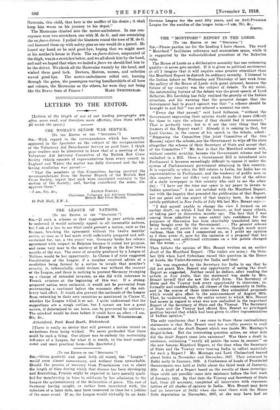THE LEAGUE OF NATIONS. [To THE EDITOR OF THE "
SPECTATOR."]
Sea,-4f such a scheme as that suggested in your article could be enforced it would naturally appeal to all reasonable nations, but I am at a loss to see what could prevent a nation, such as the German, breaking the agreement without the twelve months' notice, as soon as it had made itself sufficiently prepared and self- contained for, say, a two years' war. Germany broke her solemn agreement with respect to Belgium because it suited her purpose, and came very near to the mastery of Europe in the first twelve months of the war. The sense of security produced by a League of Nations would be her opportunity. In Clause 5 of your suggested Constitution of the League, if a member received advice of a resolution being formed by a nation to invade that member's country, it, inferentially, could declare war without the consent of the League, and there is nothing to prevent Germany trumping up a charge of intended invasion, as she did with reference to French aviators at the beginning of this war. If a strong- prepared nation were outlawed, it would not be prevented from overrunning a continent before the economic effect of the out- lawry took effect. It would also prevent the nationals of the League from returning to their own countries as mentioned in Clause 17, whether the League willed it or not. I quite understand that the suggestions are a rough outline, but I cannot see how a great nation, if determined to use force, can be prevented by outlawry. The mischief would be done before it could have an effect.—I am, [There is really no device that will prevent a nation intent on wickedness from being wicked. We never pretended that there could be such a thing. Our object was to embody the restraining influence of a League, for what it is worth, in the least compli- cated and most practical form.—En. Spectator.]


































 Previous page
Previous page